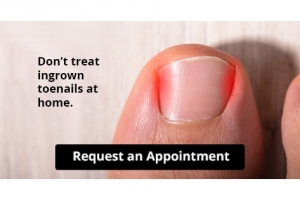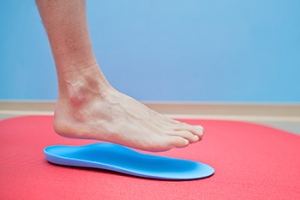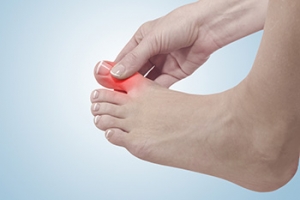
Let the Expert Treat Your Ingrown Toenails
Taking Care of Your Toddler's Feet
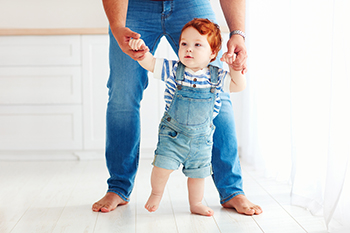
Children's feet require vigilant care during their formative years, due to their soft and pliable nature. Encouraging toddlers to walk barefoot indoors fosters natural foot growth and toe dexterity. It is essential to regularly assess shoe fit, aiming for about half an inch of growing room between the longest toe and the tip of the shoe. Experts suggest measuring their feet and adjusting shoe size every three to six months to accommodate growth. While common walking patterns, such as flat feet or in-toeing, typically resolve on their own, it is suggested you consult a podiatrist if your child experiences persistent issues or discomfort. Avoid hand me down shoes to ensure proper support and fit tailored to each child's unique foot structure. Watch for signs such as frequent tripping, pain, or reluctance to participate in activities, as they may indicate underlying foot concerns that require medical attention. For guidance on your child's foot development or to address any emerging concerns, it is suggested that you schedule an appointment with a podiatrist for a thorough exam and appropriate treatment as needed.
Making sure that your children maintain good foot health is very important as they grow. If you have any questions, contact Anas Khoury, DPM of North Eastern Foot & Ankle Specialists. Our doctor can provide the care you need to keep you pain-free and on your feet.
Keeping Children's Feet Healthy
Having healthy feet during childhood can help prevent medical problems later in life, namely in the back and legs. As children grow, their feet require different types of care. Here are some things to consider...
Although babies do not walk yet, it is still very important to take care of their feet.
Avoid putting tight shoes or socks on his or her feet.
Allow the baby to stretch and kick his or her feet to feel comfortable.
As a toddler, kids are now on the move and begin to develop differently. At this age, toddlers are getting a feel for walking, so don’t be alarmed if your toddler is unsteady or ‘walks funny’.
As your child gets older, it is important to teach them how to take care of their feet.
Show them proper hygiene to prevent infections such as fungus.
Be watchful for any pain or injury.
Have all injuries checked by a doctor as soon as possible.
Comfortable, protective shoes should always be worn, especially at play.
If you have any questions please feel free to contact our office located in Passaic, NJ . We offer the newest diagnostic and treatment technologies for all your foot and ankle needs.
What to Do to Keep Your Child’s Feet Healthy
Being a parent involves caring for your child in every way you can. You make sure they are eating the right food, being nice to others, and staying out of any trouble. However, it is also important that you are watchful of their health, more specifically their foot health. Maintaining good foot health in childhood is important in preventing later conditions in life from happening. As children continue to develop, their feet require different techniques of care. Here are some various ways in which you can help your child’s feet stay healthy.
A baby needs a lot of care and attention overall, but the importance of their feet should never be forgotten. Before a baby turns one, their feet change and develop greatly. It is important that during this time, a mother avoids putting tight socks on their child. She should also encourage movement of their feet so the baby can begin to feel more comfortable using them.
As a baby enters the toddler years of his or her life, they are begin to walk around. When your baby begins to take those first steps, it is crucial that they are wearing protective shoes on their feet. As a mother that is observant of your child’s feet, you may notice changes in them. This is completely normal as the feet are becoming susceptible to the activity of walking. It is normal for a toddler to be a bit unsteady or to “walk funny” at first.
When your child grows out of their toddler years, it is important that you begin to show him or her how to care for their feet on their own. Practice with your child proper hygiene in order to prevent foot fungus or infection. Since children are constantly on the move, it is crucial to be cautious of any accidents or injuries that might occur. If an injury occurs, it is advised that you take your child to be examined by a doctor immediately. Since your child is still growing, particular injuries can shift the way in which a bone or other important part of the foot is developing.
Babies and kids are always changing and growing. Your job as a parent is to make sure they stay healthy and making sure they are properly maintained. This involves proper foot care and making sure the feet stay healthy. Following this guide, your child can live a long and happy life.
Custom Orthotics For Seniors

Age gracefully and move freely with Custom Orthotics. For seniors seeking to maintain their independence, Custom Orthotics offer the stability and comfort essential for daily activities. Custom-tailored to your feet, they provide support, reduce pain, and enhance mobility, ensuring you're always on sure footing. Don't let age-related foot concerns hold you back. With Custom Orthotics, embrace every golden moment with confidence. Call today to schedule an appointment.
Prevention Strategies for Enhanced Safety in Elderly People
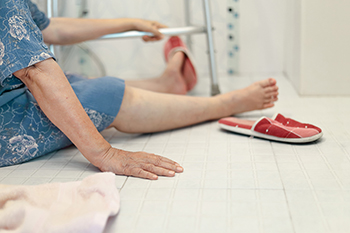
Seniors are at a heightened risk of falling due to various factors, including age-related changes in balance, vision, and muscle strength. Additionally, underlying health conditions, medications, and environmental hazards contribute to the risk of falls among older adults. Vision impairments, such as cataracts or glaucoma, can affect depth perception and increase the likelihood of tripping or misjudging distances. Muscle weakness and joint stiffness make it more challenging to maintain balance and stability while walking or standing. Furthermore, medications that cause dizziness or drowsiness further compromise seniors' ability to navigate their surroundings safely. Environmental factors like cluttered walkways, slippery floors, and inadequate lighting also pose significant fall risks. To prevent falls, seniors can take proactive measures such as participating in regular exercise to improve strength and balance and modifying home environments to eliminate hazards. Falling can impact the feet, possibly compromising daily activities. If you are interested in learning about additional fall prevention strategies, it is suggested that you contact a podiatrist who can provide you with the knowledge you are seeking.
Preventing falls among the elderly is very important. If you are older and have fallen or fear that you are prone to falling, consult with Anas Khoury, DPM from North Eastern Foot & Ankle Specialists. Our doctor will assess your condition and provide you with quality advice and care.
Every 11 seconds, an elderly American is being treated in an emergency room for a fall related injury. Falls are the leading cause of head and hip injuries for those 65 and older. Due to decreases in strength, balance, senses, and lack of awareness, elderly persons are very susceptible to falling. Thankfully, there are a number of things older persons can do to prevent falls.
How to Prevent Falls
Some effective methods that older persons can do to prevent falls include:
- Enrolling in strength and balance exercise program to increase balance and strength
- Periodically having your sight and hearing checked
- Discuss any medications you have with a doctor to see if it increases the risk of falling
- Clearing the house of falling hazards and installing devices like grab bars and railings
- Utilizing a walker or cane
- Wearing shoes that provide good support and cushioning
- Talking to family members about falling and increasing awareness
Falling can be a traumatic and embarrassing experience for elderly persons; this can make them less willing to leave the house, and less willing to talk to someone about their fears of falling. Doing such things, however, will increase the likelihood of tripping or losing one’s balance. Knowing the causes of falling and how to prevent them is the best way to mitigate the risk of serious injury.
If you have any questions, please feel free to contact our office located in Passaic, NJ . We offer the newest diagnostic and treatment technologies for all your foot care needs.
Falls Prevention
Elderly Americans are very susceptible to falls as they get older. Everyone experiences decreases in flexibility, balance, strength, and the senses as they age. This correlates to some eye-opening statistics. 1 in 4 Americans aged 65 and older fall each year. An elderly American is being treated for a fall in an emergency room every 11 seconds. In light of these striking statistics, one can see the importance of taking steps to prevent falls.
Finding an exercise program for the elderly is an excellent way to reduce the likelihood of falls. Look for an exercise program that improves strength and balance. Elderly people who live a more sedentary lifestyle, with little physical activity, are at an increased risk of falling. Wearing well-fitted footwear that provides good foot support and cushion will help prevent falls from poorly fitted shoes. Talking to a podiatrist about your susceptibility to falls and about inspecting your prescriptions will help to avoid any medication that could make falls more likely. Due to a decline in the senses among the elderly, having your eyes and hearing checked is recommended.
Around half of all falls occur in the household. Removing tripping hazards in the home and making it more accommodating to older persons can significantly reduce falls. Some notable household changes include increasing lighting around the house, installing grab bars in the shower and bathroom, and making sure the floor is clear of clutter. Other smart options include installing a shower chair, using rubber-bottomed rugs, and placing railings on both sides of stairwells.
Finally, discuss with a doctor and your family about your fear of falling. This will help to increase awareness among the population on the need for fall prevention. A lack of awareness on the matter, and a downplaying of importance are what increase the risks of falling. Following these tips can help to reduce the risk for yourself and your loved ones.
Do I Need Orthotics?
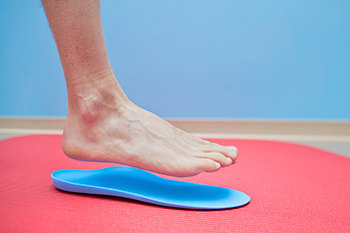
Orthotics, custom-made shoe or heel inserts, are designed to cater to individual needs. Podiatrists recommend orthotics to address foot, leg, or back issues, aiming to enhance biomechanics, redistribute pressure, or accommodate deformities. They are distinct from over-the-counter inserts, being highly customized and prescribed when other treatments prove ineffective. To determine the need for orthotics, a podiatrist assesses symptoms, conducts physical examinations, and may use imaging techniques to diagnose conditions. Orthotics prove beneficial for various medical conditions, including arthritis, back pain, bunions, and more. They also provide support, cushioning, and alignment correction, while reducing the need for invasive treatments. Orthotics come in various types and materials and are tailored to individual conditions. Effectiveness varies depending on factors like fit, prescription, footwear, and adherence to usage recommendations. While studies support their use, proper fit and usage are essential for success. If you are wondering if custom-made orthotics can help you, it is suggested that you make an appointment with a podiatrist.
The benefits of custom orthotics are far-reaching and can make a significant impact on your daily life. Whether you are an athlete looking to enhance your performance, a healthcare worker on your feet every day, someone who experiences chronic foot pain, or someone who wants to improve their overall comfort and well-being, custom orthotics can be a game changer.
Custom orthotics provide support, stability, and relief for a variety of foot conditions ranging from flat feet to heel pain. They can even help prevent injuries and address more severe foot concerns, such as plantar fasciitis and diabetic foot issues.
Contact Anas Khoury, DPM at North Eastern Foot & Ankle Specialists to create tailored orthotics for you and enjoy a higher quality of life, reduced pain, and increased mobility. With the right orthotics, you can continue doing the things you love, whether it’s running, dancing, or simply walking comfortably without discomfort.
If you are suffering from foot discomfort or have concerns about your foot health, do not hesitate to contact Anas Khoury, DPM at North Eastern Foot & Ankle Specialists to explore the benefits of orthotics for you. Your feet are the foundation of your body and investing in their well-being can lead to a happier, healthier, and more active lifestyle. Your feet will thank you!
If you have any questions please contact our office located in Passaic, NJ . We offer the newest diagnostic and treatment technologies for all your foot and ankle needs.
Investing in Custom Orthotics Means Investing in Foot Health
Custom orthotics offer a tailored approach to foot health, providing a host of benefits that extend far beyond conventional shoe inserts. One of the primary advantages lies in their ability to address specific biomechanical issues. Unlike off-the-shelf inserts, custom orthotics are crafted based on an individual's unique foot structure, gait, and any existing foot conditions.
The personalized design of custom orthotics ensures optimal support for the arches, promoting proper alignment and distributing pressure evenly across the feet. This can be particularly beneficial for individuals dealing with issues such as overpronation or underpronation, as custom orthotics help correct imbalances that may lead to discomfort or injury.
Beyond biomechanics, custom orthotics can alleviate a range of foot problems, including plantar fasciitis, bunions, and metatarsalgia. They provide targeted relief to areas under stress, reducing pain and inflammation. Additionally, for those with specific medical conditions like diabetes, custom orthotics can play a crucial role in preventing complications associated with poor foot health.
Comfort is another key aspect of custom orthotics. By accommodating the unique contours of an individual's feet, these inserts enhance overall comfort, making daily activities more enjoyable. Whether for athletes looking to optimize performance or individuals seeking relief from chronic foot pain, custom orthotics offer a versatile solution.
Investing in custom orthotics is an investment in long-term foot health. They not only provide immediate relief but also contribute to the prevention of future issues. With the ability to seamlessly integrate into various types of footwear, custom orthotics empower individuals to prioritize foot comfort without compromising on style. In essence, custom orthotics are a personalized prescription for happy, healthy, and pain-free feet.
Big Toe Pain May Mean Gout
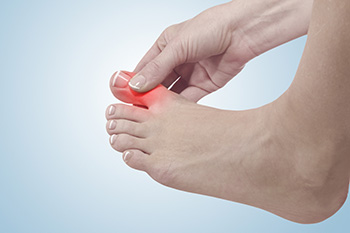 Gout, a type of arthritis, can cause intense pain that often starts in the big toe. This condition is caused by a build up of needle shaped uric acid crystals in the joints, leading to inflammation. The big toe is where painful gout attacks commonly occur because it is a cooler part of the body, and uric acid is more likely to crystallize there. Gout patients usually experience painful joint flares for a week or so, which then disappear for a period of time. Some patients do not experience their next flare for a year or more. Lifestyle factors such as a diet particularly rich in purine-containing foods in addition to genetics can contribute to gout development. During a gout flare up, the big toe may become red, swollen, and extremely tender. It is essential for those experiencing big toe pain to seek medical attention, as managing gout requires having a well informed plan. If you have pain in your big toe and suspect it may be gout, it is suggested you schedule an appointment with a podiatrist who can help you find relief from the acute pain associated with this condition.
Gout, a type of arthritis, can cause intense pain that often starts in the big toe. This condition is caused by a build up of needle shaped uric acid crystals in the joints, leading to inflammation. The big toe is where painful gout attacks commonly occur because it is a cooler part of the body, and uric acid is more likely to crystallize there. Gout patients usually experience painful joint flares for a week or so, which then disappear for a period of time. Some patients do not experience their next flare for a year or more. Lifestyle factors such as a diet particularly rich in purine-containing foods in addition to genetics can contribute to gout development. During a gout flare up, the big toe may become red, swollen, and extremely tender. It is essential for those experiencing big toe pain to seek medical attention, as managing gout requires having a well informed plan. If you have pain in your big toe and suspect it may be gout, it is suggested you schedule an appointment with a podiatrist who can help you find relief from the acute pain associated with this condition.
Gout is a painful condition that can be treated. If you are seeking treatment, contact Anas Khoury, DPM from North Eastern Foot & Ankle Specialists. Our doctor will treat your foot and ankle needs.
What Is Gout?
Gout is a form of arthritis that is characterized by sudden, severe attacks of pain, redness, and tenderness in the joints. The condition usually affects the joint at the base of the big toe. A gout attack can occur at any random time, such as the middle of the night while you are asleep.
Symptoms
- Intense Joint Pain - Usually around the large joint of your big toe, and it most severe within the first four to twelve hours
- Lingering Discomfort - Joint discomfort may last from a few days to a few weeks
- Inflammation and Redness -Affected joints may become swollen, tender, warm and red
- Limited Range of Motion - May experience a decrease in joint mobility
Risk Factors
- Genetics - If family members have gout, you’re more likely to have it
- Medications - Diuretic medications can raise uric acid levels
- Gender/Age - Gout is more common in men until the age of 60. It is believed that estrogen protects women until that point
- Diet - Eating red meat and shellfish increases your risk
- Alcohol - Having more than two alcoholic drinks per day increases your risk
- Obesity - Obese people are at a higher risk for gout
Prior to visiting your podiatrist to receive treatment for gout, there are a few things you should do beforehand. If you have gout you should write down your symptoms--including when they started and how often you experience them, important medical information you may have, and any questions you may have. Writing down these three things will help your podiatrist in assessing your specific situation so that he or she may provide the best route of treatment for you.
If you have any questions, please feel free to contact our office located in Passaic, NJ . We offer the newest diagnostic and treatment technologies for all your foot care needs.
Gout
Gout is a form of arthritis that is caused by a buildup of uric acid crystals in the joints. This considered to be one of the most frequently recorded medical illnesses throughout history. Gout occurrences in the US have risen within the past twenty years and the condition now affects 8.3 million people which is 4% of all Americans. Researchers have found that gout affects men more than women and African-American men more than white men.
Symptoms of gout are warmth, swelling, discoloration, and tenderness in the affected joint area. The small joint on the big toe is the most common place for a gout attack to occur.
People who are obese, gain weight excessively, drink alcohol heavily, have high blood pressure, or have abnormal kidney function are more likely to develop gout. Furthermore, certain drugs and diseases are likely to increase levels of uric acid in the joints which eventually leads to gout. You are also more likely to develop gout if you eat a lot of meat and fish.
Many who experience gout attacks will experience repeated attacks over the years. Some people who have gout symptoms, may never have them again, but others may experience them several times a year. If you have gout symptoms throughout the year, you may have recurrent gout. Those who have gout should also be careful about their urate crystals collecting in their urinary tract, because this may lead to kidney stones.
Diagnosis for gout is done by checking the level of uric acid in the joints and blood. Your podiatrist may also prescribe medicine to reduce uric acid buildup in the blood, which will help prevent any gout attacks.
To treat gout, your podiatrist may also prescribe you Anti-inflammatory medication (NSAIDs) which will relieve the pain and swelling of a gout episode and it can also shorten a gout attack. Maintaining a healthy diet is also a proven method to prevent gout attacks.
